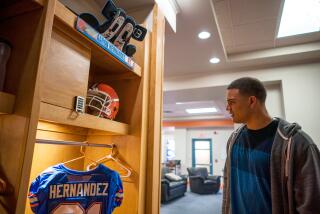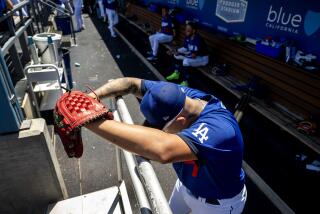Dying to Be Heard
In May, Justin Alzado became credentialed by the National Athletic Trainers Assn., and has been hired as a personal trainer at a health club near his home in Roswell, Ga. He preaches a natural route to physical fitness and discourages use of legal, over-the-counter supplements such as creatine and ephedrine.
He is so committed to his message that MTV used him for an upcoming episode of the reality show “Flipped.” In it, Alzado, 20, meets a Southern California junior college football player who says he is considering using steroids.
“I explain to him why he shouldn’t,” Justin said in a recent interview. “I tell him my dad died because of that.”
Justin is the only child of Lyle Alzado, the star NFL defensive end who attributed excessive steroid use to the brain cancer that killed him.
More than 10 years after Lyle Alzado’s pleas to end steroid use in sports were muted by his death, family members said they are frustrated but not surprised that the message has been diminished by time and dismissed by several athletes.
“I understand the goal of some of these guys; that athletes are ambitious people,” Justin said. “At the same time, I’m disappointed my dad’s words are going unheard. He made a strong effort to warn others of the risks of steroids and, hopefully, they’ll see the big picture in the end.”
Lyle Alzado, who played for the Denver Broncos, Cleveland Browns and Los Angeles Raiders from 1971-85, died at 43 on May 14, 1992. He insisted that almost 20 years of steroid use was the major contributing factor.
“When you eat right and drink right and you don’t stay out late at night and you get sick, in my case, it was from steroids,” Alzado told The Times in a January 1992 interview. “I made a big mistake, and I [am] trying to tell the kids of America to stay away from it because I believe wholeheartedly that it has given me cancer. I would hate for anyone else to go through this pain.”
The NFL has conducted random steroid testing since 1990. But the use of steroids and other illegal performance enhancing substances has become an increasing concern in sports that do not test, such as Major League Baseball. In a recent admission of steroid use by former National League most valuable player Ken Caminiti, he estimated use in the sport to be at least 50%.
“I actually think Lyle would say he understands completely why steroids continue to be out there,” said Cindy Alzado, Justin’s mother and the second of Lyle’s four wives. “He was proof that when you have a passion, nothing will keep you from it. It took dying for him to understand how bad that logic was.”
Alzado admitted using steroids throughout his professional career.
He was an intimidating, 6-foot-3, 255-pound defender, an NFL defensive lineman of the year in 1977 who led Denver’s famed “Orange Crush” defense to a Super Bowl appearance. He once fought Muhammad Ali in a boxing exhibition. He was an All-Pro in 1978 as a Bronco and 1979 as a Brown and was the NFL’s 1982 comeback player of the year with the Raiders.
The bearded Alzado’s aggressive style and colorful personality made him one of Raider owner Al Davis’ favorite players. In one game, Alzado ripped the helmet off New York Jet offensive tackle Chris Ward and flung it downfield. The NFL responded by instituting a rule that outlawed helmet throwing.
“Nobody loved that game more than Lyle,” Cindy Alzado said. “He truly was a warrior.”
Yet, she said that she believes the steroid abuse caused Lyle to resort to rages, including episodes when he would hit her. She said the domestic abuse prompted her to summon Manhattan Beach police to their home at least five times during their brief 1984-85 marriage. She said Lyle was never arrested.
“He was always Mr. Calm by the time they got to the house,” Cindy said. “It always ended the same way, with him signing autographs for [the officers].”
Lyle and Cindy met in the 1960s while attending Lawrence High in Cedarhurst, N.Y. After Lyle divorced a woman he met at Yankton College in South Dakota, he reunited with Cindy in New York and they lived together from 1981-85.
“When we wanted to have a child, I was concerned his steroid habit would affect the baby, so Lyle quit for several months, but as soon as Justin was born [in 1982], he was back on them,” Cindy said.
Cindy said Lyle was never declared impotent, an occasional side effect of steroid use, but she said his sperm count was diagnosed as low.
She said he followed a disciplined pattern of steroid intake, using three times a week while frequenting Gold’s Gym in Venice.
One of the Alzados’ numerous arguments was in Gold’s parking lot. Cindy said she tried to run over Lyle in her car.
“He asked me more than once, ‘Why am I such a success in my professional life and such a failure in my personal life?’ ” Cindy said. “I told him it was the steroids, but he couldn’t let them go because he couldn’t let go of football.”
Among her numerous attempts to encourage Lyle to quit using, Cindy once read him a Sports Illustrated article depicting the admission of steroid use by former NFL offensive lineman Steve Courson. When Courson discussed his relationship problems, Cindy said she told Lyle, “This is proof. This is us.”
In 1984, after Alzado and the Raiders had won the Super Bowl by dominating the defending champion Washington Redskins, 38-9, Cindy said Lyle’s steroid use advanced from pill popping to injections. Saying she believed Lyle’s age was the reason behind his change in usage, Cindy called Raider team doctor Robert Huizenga and told him the steroids were altering Lyle’s personality, robbing her of “the Lyle I knew and loved.”
“Lyle and I used to have incredibly horrible arguments,” said Huizenga, who served as Raider doctor from 1983-1991. “I was telling him the steroids were markedly affecting his cholesterol level and liver function and he would respond, ‘Leave me alone. I can’t play in the NFL without this stuff.’ ”
Former Raider teammate Mike Haynes recalls watching an artist on the sideline of a Raider game work on a portrait of Alzado sitting on his helmet. The artist’s sketch detailed a large lump below the right side of his hip, the spot where Alzado would inject the steroids. Haynes said he wondered to himself: How many times would you have to inject to make a lump that big? Cindy said Lyle told her that Raider teammates chided him about “that baseball in his back pocket.”
“In training camp, my room was next to his and there were many times I could hear him just screaming at whoever he was talking to on the phone,” Haynes said. “I’d see him 15 minutes later and he’d be acting like nothing was bothering him at all.
“In one game, he did something to somebody and an official said, ‘Alzado, I saw you, and if you do it again, I’ll toss you.’ Lyle says, ‘You don’t have the [guts] to toss me.’ He was really angry, so I tried to calm him down so he wouldn’t get kicked out. He looked at me with these bloodshot eyes and just shoved my arm off of him. He was just such a gentle, kind, giving guy otherwise. You’d see this other side of him, though, and wonder, ‘Where did this come from?’ ”
Alzado retired after the 1985 season. Cindy filed for divorce in January 1985. She said she moved into a Manhattan Beach apartment for three months, but after repeated visits by Alzado she took Justin back to Cedarhurst.
“Lyle and I were both volatile. It was just crazy between us,” Cindy said. “He would be very jealous, very insecure and very irrational about us. It was a rough decision, but I had no choice but to get away. I blame our divorce on the steroids.”
Justin has few vivid memories of his father--trips to the mall for toys, having fun at the beach.
Cindy, who received $2,500 in monthly child support and alimony payments from Lyle, clearly remembers a 1988 trip to visit Lyle in California with Justin. After a stop at a yogurt shop near Alzado’s West Hollywood restaurant, Lyle collapsed and suffered a cut on his nose that required 17 stitches to close.
Huizenga said he requested Alzado submit to an MRI exam of the brain, but Alzado, who admitted to using human growth hormone during a failed comeback attempt in 1988, declined.
“He told me he didn’t need one because one of those idiot bodybuilders he knew had told him he collapsed because his neck muscles were so built up that it must have cut off the circulation,” Cindy said. “Lyle believed it. But I’ve always regretted that we didn’t get him in there for that MRI, because I’m sure that was the first sign of that tumor.”
Huizenga said Alzado acknowledged using steroids even after his playing days were finished.
“He was an example of one of the big problems in steroids that isn’t discussed as often as it should be: how difficult it is to come off of,” Huizenga said. “Someone would tell Lyle he didn’t look as big as he used to on TV, and boom, he was right back on it. There are severe psychological pulls with steroids, serious hormonal withdrawals for those who try to stop.”
When Alzado received the brain cancer diagnosis in April 1991, Huizenga said he accompanied Alzado to his home and was shown a massive shopping bag of drugs. Alzado declared himself through with them.
“He told me he wanted to champion a cause, that he was certain steroids had done this to him, and he wanted to let the world know what he had done, at the expense of his career luster,” Huizenga said.
Said Cindy Alzado: “It was the hardest thing he did in his life, standing up there and looking so weak, because he was so proud of his physicalness. Justin has told me he’s more proud of his dad coming forward on this than by any of his awards.”
Justin has grown to 6-2, 240 pounds. He did play one season of high school football, spending his sophomore year wearing No. 77--Lyle’s number--as a starting defensive end for Roswell High’s junior varsity team.
“It was a blast, but I think there were a lot of people expecting me to be as good as my dad,” Justin said.
He returned to his favorite sport, basketball, and averaged 18 points a game as a senior.
“Kids told Justin when he was growing up how lucky he is that his dad’s a celebrity,” Cindy said.
Justin responded, “I’m not lucky. My dad’s dead.”
More to Read
Go beyond the scoreboard
Get the latest on L.A.'s teams in the daily Sports Report newsletter.
You may occasionally receive promotional content from the Los Angeles Times.











